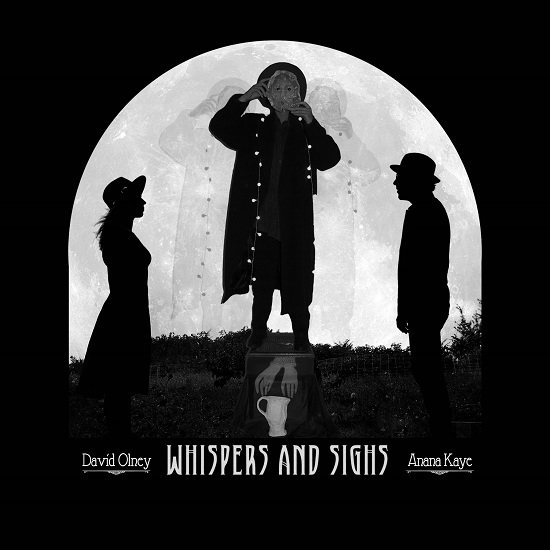
Where do I start with this one? Five stars would be a good place, I suppose. It’s not even five stars that needs a lot of thought. It’s not an album that needs to grow on you; it’s all there instantly first time around. David Olney already has a fabulous legacy, but this is a pretty impressive final piece in the jigsaw. If you absolutely must have a label for it, you would probably go with Americana but there’s a spectacular range of influences and references here, pushing the boundaries in all directions to create a rich and incredibly satisfying album. The album’s credited to David & Anana Kaye (his protégés, for want of a better word), it’s a trio effort with writing and playing credits going to David, Anana, and her partner, Irakli Gabriel. To stretch the Americana boundaries a little further, Anana and Irakli are from Georgia, the one that Paul McCartney sung about, rather than Ray Charles.
Maybe it’s hindsight, with the knowledge of David Olney’s death last year, but ”Whispers and Sighs” has valedictory undertones, particularly the album’s closing song, “The Great Manzini (Disappearing Act)”, looking at life through the eyes of a worn-out and weary entertainer. It sounds resigned and laconic rather than cynical because of the warmth of David Olney’s smooth baritone delivery, the layered a cappella Anana Kaye intro, and the bowed cello and pizzicato violins. It’s the perfect end to the album.
The ideas and influences (musical and lyrical) are varied and you can expect a surprise around every corner, whether it’s the melancholy string fragments that open and bisect the album, “The Station” (Prelude)” and “Sideview (Interlude)”, the layered Anana Kaye celestial choirs or Rolling Stones-influenced dystopian rocker “Last Days of Rome” kicking in like “Start Me Up” and morphing into “Sticky Fingers” era Stones with Bobby Keys-style sax, a raw David Olney vocal and lyrics that obliquely reference the Trump administration.
And that’s just the start, before we get into the Shakespeare references. The title song is influenced by “Romeo and Juliet” and features Anana’s layered choral vocals and a string quartet, while the busy and angry uptempo “Lie to Me Angel” ends with David declaiming King Lear’s ‘blasted heath’ speech to end the piece as the manic backing fades out. Coming straight out of “Lie to Me Angel”, almost without a gap, is “Thank You Note”. It’s a song with a sinister feel, a tango overlaid with Eastern European strings and lyrics hinting at supernatural histories. You could imagine this song soundtracking a vampire movie.
“Whispers and Sighs” is a classic album, seamlessly pulling together a huge variety of musical references to create a work that surprises at every musical turn and is packed with subtle and thought-provoking lyrics that encourage the listener to think, rather than hammering a message home. As well as the classic country themes of longing and regret, you’ll find anger, mystery and history in my favourite album of the year so far.
This album is a fitting memory to David Olney as the flame passes on to Anana and Irakli.
“Whispers and Sighs” is released in the UK on Friday March 19th on Schoolkids Records (SMR-067).
Here’s a sneak preview with the video of “My Favourite Goodbye”:
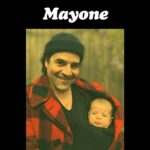 This is the final album review of the strangest year I’ve had in a very, very long time. It’s quite unusual to release albums of original material in December; it’s normally a time for retrospectives, compilations and TV personalities singing Christmas songs. This year, however, all bets are off as the virus has closed so many doors while opening a few new ones. Musicians have been adapting to a rapidly-changing environment throughout this century, so what’s the big deal about a pandemic? Home studios have been with us for a long time and it’s routine now to share huge audio files online; you can make an album with dozens of musicians without ever meeting them.
This is the final album review of the strangest year I’ve had in a very, very long time. It’s quite unusual to release albums of original material in December; it’s normally a time for retrospectives, compilations and TV personalities singing Christmas songs. This year, however, all bets are off as the virus has closed so many doors while opening a few new ones. Musicians have been adapting to a rapidly-changing environment throughout this century, so what’s the big deal about a pandemic? Home studios have been with us for a long time and it’s routine now to share huge audio files online; you can make an album with dozens of musicians without ever meeting them.
The album “Mayone”, by songwriter and multi-instrumentalist Steve Mayone, has a couple of reference points. The uncertainty generated by COVID 19 gave the Steve the impetus to get this album together, and the first Paul McCartney solo album “McCartney” (fifty years old this year) gave him the inspiration. The parallels between the two aren’t just around the experience of working alone in the studio alone as therapy; Steve has echoed the ebb and flow of Paul McCartney’s album, and some of the themes as well (more about that later).
The first listen to this album left two lasting impressions; that it was a guitar player’s album and that it had a very seventies feel. Before reading the press release, I felt that the album had the feel of a solo Beatles project (right) and that the solo Beatle was George Harrison (wrong). It’s definitely a guitar player’s album, though; there are multiple layers of acoustic and electric guitars throughout the album, with the additional spicing of mandolin, banjo, ukulele and lap steel. I’m sure one of Steve’s aims was to make people revisit “McCartney”; it worked in my case and I’m recommending it to you as well.
“Mayone” has thirteen tracks (as does “McCartney”) and mixes up instrumental soundscapes with some beautifully-crafted songs. The instrumentals are perfect little vignettes scattered across the album, starting with the finger-picked acoustic, “The Sweet Suzanne” referencing McCartney’s “The Lovely Linda” even down to the alliteration in the title; Steve Mayone is paying serious attention to detail here.
There’s a huge variety to the songs here, from the no-prisoners-taken rock of “Sweet Little Anchor”, hinting at Bob Seger and Tom Petty to the melancholy “Airport Goodbyes” and the archetypical Christmas song (with an ironic drunken stupor twist), “Happy Alcoholidays”. These are all great songs but the perfect McCartney match is still to come. “Stuff” is a takedown of consumerism on a personal and global level that moves McCartney’s “Junk” on by fifty years, but Steve takes it a stage further. The McCartney “Junk” appears in a vocal version on track six and as “Singalong Junk” (an instrumental) on track eleven; guess the track sequencing of the “Stuff” vocal and instrumental on Steve’s album?
Steve Mayone has created an album of material that’s totally original, while cleverly referencing and emulating McCartney’s “McCartney”. “Mayone” is a 2020 classic; let’s hope it lasts as long as “McCartney”.
“Mayone” is released in the UK on Friday December 18th on Mayone Music.
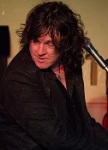 We’re big fans of Bob Malone here at MusicRiot so when I got the chance to meet up for a chat on the final night of his UK tour it was a bit of a no-brainer. Bob’s been in the UK for three weeks touring in support of his “Mojo Deluxe” album and the “Mojo Live” DVD and The 100 Club gig was the climax of a hectic tour schedule. So a very noisy 100 Club dressing room is where we got the chance to talk about old pianos, New Orleans and Southside Johnny, among other things:
We’re big fans of Bob Malone here at MusicRiot so when I got the chance to meet up for a chat on the final night of his UK tour it was a bit of a no-brainer. Bob’s been in the UK for three weeks touring in support of his “Mojo Deluxe” album and the “Mojo Live” DVD and The 100 Club gig was the climax of a hectic tour schedule. So a very noisy 100 Club dressing room is where we got the chance to talk about old pianos, New Orleans and Southside Johnny, among other things:
Allan – So it’s approaching the end of the tour and we met on the first night in Southend. How has it been since then?
Bob – It’s been great; a few funky gigs, a few spectacular gigs and we’ve worked hard. We had a couple of nights where we didn’t have gigs but we still had a radio show or a long drive; we’re a hard-working group.
Allan –Have you had any particularly good gigs?
Bob – This one’s definitely gonna be a good one and Keighley Blues Club, that was a really great crowd and Scotland as well, and we also played on the Isle of Wight.
Allan – I remember when we met in Southend you were talking about Italian audiences.
Bob – They’re full on, right out of the box, from the first song.
Allan –Do you notice any differences in the audiences around the UK?
Bob – Well it sometimes takes three or four songs here. The north is different from the south, as you know. I didn’t until I did these long tours here; England was just England like people think America is just America but here it’s five different countries with completely different cultures.
Allan – Have you played The 100 Club before?
Bob – No, but its reputation precedes…
Allan – How does that feel?
Bob – It feels good. I was soundchecking with the grand piano earlier and the sound engineer had footage of Paul McCartney playing that same piano.
Allan – I think it’s great to see it with the lights up and look at all those great photos around the walls of the people that have played here in the past.
Bob – I love places with history like this; you feel like you’re part of a continuum.
Allan – You’re promoting the Mojo Deluxe album at the moment. What kind of a reception has the album had?
Bob – I think it’s the most press and radio I’ve had on anything I’ve done and it’s my twentieth year of making records, so I’m happy with that.
Allan – After doing what I think of as the day job with John Fogerty, how does this compare? It must be a huge culture change.
Bob – It’s different. I’ve been doing this for twenty-five years; this is what I do, and I’ve been playing with John for almost five years now. With this, so long as the sound man is competent I’m happy. Everyone thinks it must be weird to go from small crowds to big crowds, but it really isn’t. As long as it’s a good musical experience and you’re connecting with an audience; that’s why we play. You can’t really control the size of the crowd and also when I do this it’s a mission; when I play with John it’s his gig. I’m lucky to be there but it’s his gig. I get my solo but other than that, it’s all about him and I’m just in the background.
Allan – Trying to avoid the pyrotechnics…
Bob – Trying not to burst into flames during “Fortunate Son”, exactly.
Allan – So when you’re out doing your own stuff, here and in the States, what would be your ideal band line-up?
Bob – The ultimate, when I’m not touring; when I’m LA, and I don’t have to put people in hotel rooms would be a nine-piece band. I just did a DVD, which I did the way I would like to do it and I had three female background singers, percussionist, drums, bass and guitar. I do a lot of stuff with horns as well, for years I had a horn section, so it would be a nine to eleven piece band and a second keyboard player would be great, to play the organ parts. (If you’re really paying attention, you’ll notice that the total number of musicians is only eight, but there’s a slide guitar player on there as well. I hope your heart isn’t broken by that omission Marty Rifkin.)
Allan – On your own tours, particularly in the UK, you rely on the venue providing the piano. Have you had any horror stories with that in the past?
Bob – Well, usually I carry a digital piano for when there’s no real alternative, but most of the places I play now, if there is a real piano, it’s usually in good shape, but I’ve been to places that had a hundred year old upright and some of the keys didn’t work but I kind of like to play those anyway, just for the challenge. It’s like going in the ring with this old piano and fighting it to see who wins. I love real pianos because they all have personality; the digital ones are handy and they’re light and they don’t go out of tune, but they don’t have much of a personality. They get the job done.
The one in Southend, that’s got some issues. It’s got some broken strings; it’s one that I fight to the death but I like playing it because it’s an old Bösendorfer.
Allan – I did notice a few problems at the soundcheck that night…
Bob – It needs a rebuild, but still I’m glad to see it.
Allan – You’re classically and jazz trained; was there any one thing that turned you into a rock/blues pianist?
Bob – The rock thing came first. One of those things was hearing “Sergeant Pepper” for the first time, so it’s you guys, it’s your fault. Then I heard Billy Joel and Elton John and not very long after that the New Orleans thing, which blew me away, and then Ray Charles and I became a huge student of that stuff but the rock stuff was always there.
Allan – Were you singing right from the start?
Bob – I started singing when I was fifteen probably. I started singing because I wanted to impress a girl I had a crush on. I just played classical piano but “Your Song” by Elton John was the first thing I ever sang in public; I thought ‘She’ll love me if I sing this song’. I was a terrible singer, some people still say I am, but I learned to work with what I have.
You write songs and there are obviously lots of people with better voices than me but when you write songs you have a story to tell and people always respond to the story and sometimes you’re the only person that can tell it.
Allan – We’ve had “Mojo Deluxe” this year, so what’s next on the agenda.
Bob – Well, I’ve got this DVD coming out and the audio from that was so good, we’re thinking of putting that out as a live record next year and I’ll make another new record, so I’ll probably get the live one out next year and in 2017 I’ll have a new studio album. I’ve got to get realistic about this; I’ve got about half the songs I need for another record.
Allan – I interviewed Southside Johnny in July 2014 in London…
Bob – Southside Johnny was also one of the big things in my youth and I should mention this because growing up in New Jersey, we all knew Southside Johnny. This was the 80s and you couldn’t hear that kind of music on the radio at all and so my first real exposure to r’n’b, blues, horn section kinda music was Southside and I learned from that and went back and figured out all the other stuff. He was huge for me.
Allan – When I interviewed him at Shepherds Bush Empire last July, we spoke about his new album “Soultime!” and he said they were aiming to get it out for Christmas 2014 and that finally came out in August this year.
Bob – Yeah, that’s about right. I toured here last year and I had half of “Mojo Deluxe” out as “Mojo EP”. We had finished recording and it was half-mixed and there were some problems and we couldn’t get the other half mixed in time and the promoter said ‘The whole thing is you have a record out for this tour; we can’t get any press without a record’ so we had half a record out as an EP, just in the UK for the tour.
Allan – And that worked really well as a sampler for the album.
Bob – And by the end of last year the whole thing was done but then we needed a three month ramp for the release date to get it publicised and I was touring through the spring, so we just put the whole thing off and it came out almost a year later. That’s how it works. There are so many factors; if you have a lot of money involved, you can get things done a lot quicker. On a limited budget, you still need time to publicise, so you often end up delaying.
Allan – One final question; do you have one song that tears you up and gets you really emotional?
Bob – Yeah, “One for my Baby”, the Sinatra song; that one kills me every time. It depends on the day; it could be something else on another day.
Allan – Thanks very much, Bob.
And there you go; a private audience with the great Bob Malone, who was as entertaining offstage as on. Since we spoke, I’ve had a chance to watch the “Mojo Live” DVD and it’s superb, capturing the magic of a one-off performance absolutely perfectly. It has great performances from all of the musicians and it’s a whole load of fun; keep an eye out for it.
Every year there are hundreds of music-related books published, mainly biographies or autobiographies and they range from the very serious to the completely frivolous and from very well written to ‘see me after school’. These might not all have been published in 2014, but they were all on this year’s reading list. These books are all highly recommended if you’re interested at all in the background to the tunes you listen to or bands you go to watch, or even if you just want scurrilous anecdotes about sex and drugs. I’m making no attempt to rank these because they’re all so different, so, in no particular order:
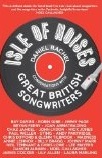 “Isle of Noises” – Daniel Rachel
“Isle of Noises” – Daniel Rachel
This is the serious one. It’s a series of interviews with famous (mostly) British songwriters which explores the ways in which songwriters work. It’s incredibly well researched (even some of the artists point that out) and obviously a labour of love for Daniel Rachel; if you have any interest at all in how songs are written, this is a great read. Don’t expect to discover the perfect songwriting method because you discover very early on that everybody writes differently. The writers being interviewed cover a wide range of styles ranging from the Sixties to the present day, so the scope of the project is enormous. Every time I meet someone who’s read it, we compare notes about which songwriter comes over as the most pretentious.
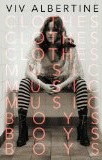 “Clothes, Clothes, Clothes, Music, Music, Music, Boys, Boys, Boys” – Viv Albertine
“Clothes, Clothes, Clothes, Music, Music, Music, Boys, Boys, Boys” – Viv Albertine
The stories from the punk era alone would make this worth reading (guitarist in The Slits, friend of Sid Vicious and girlfriend of Mick Jones) and there are plenty of tales of bad behaviour, but the latter part of the book tells us much more about Viv Albertine and her struggles to have a baby, to beat cancer, to survive a failing marriage and to take up guitar again and re-invent herself as a solo artist (her album “The Vermilion Border” was released in 2012). If you need confirmation of the entrenched sexist attitudes of the music and publishing businesses, you’ll find it here.
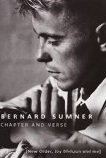 “Chapter and Verse” – Bernard Sumner
“Chapter and Verse” – Bernard Sumner
It’s difficult to see this as anything other than attempt to address some of the claims made by Peter Hook in his two books, but Bernard obviously feels hurt by some of the things that have been said and wants to let the public hear his (and New Order’s) version. The terse prose style is a stark contrast with Hooky’s “man-down-the-pub” delivery; there’s no grandstanding and a lot of self-deprecation in this memoir. Bernard seems to have a genuine affection for his ex-bandmate (and friend) and the over-riding impression the book leaves is of puzzlement at Hooky’s recent actions. The only jarring note is the inclusion of a transcript of a hypnosis experiment with Ian Curtis; I’m not sure why it happened in the first place, and I’m not sure why it was published. Other than that, a good read.
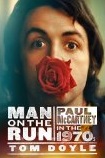 “Man on the Run – Paul McCartney in the 70s” – Tom Doyle
“Man on the Run – Paul McCartney in the 70s” – Tom Doyle
Tom Doyle has correctly identified a gap in the market for a book dealing with Paul McCartney’s immediate post-Beatles life (Peter Doggett’s “You Never Give me Your Money” focusses on the financial shenanigans of the period and the breakup of the relationship with John Lennon) and, perhaps surprisingly, he got Macca’s full co-operation with the project. Although there are some anecdotes which are excruciatingly embarrassing for the subject, there’s still a nagging little doubt that he’s manipulating the project at times. What the book clearly shows is that during that period, Paul McCartney’s decision-making was inconsistent and sometimes bizarre (trying to take a huge amount of dope into Japan, for example) and that he has a need to control situations and these two things, singly or combined, are the cause of most of the incidents covered. It’s a fascinating read, although it’s still not clear whether he’s man running away from or towards something.
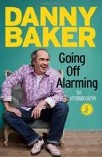 “Going off Alarming” – Danny Baker
“Going off Alarming” – Danny Baker
This is the second volume of Danny Baker’s memoirs and, unsurprisingly, the written Danny Baker sounds very much like the radio and TV Danny Baker. He uses the preface to explain why he won’t be writing a misery memoir and the introduction to explain the reason for the wonky chronology between the two books (after the first book was published, friends and family reminded him of stories he’d left out, including being shot up the arse in Bermondsey). It’s a romp through the crazy world of Danny Baker up to the point where he was sacked from “Pets Win Prizes” and is full of hilarious, mainly self-deprecatory anecdotes about his domestic and professional life. There are some genuine laugh-out-loud moments and it entertains throughout.


